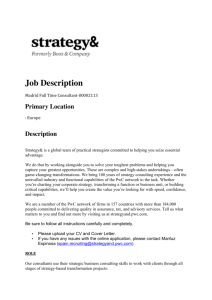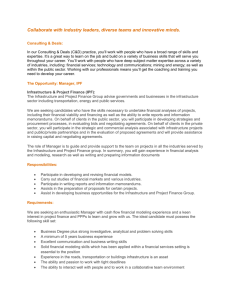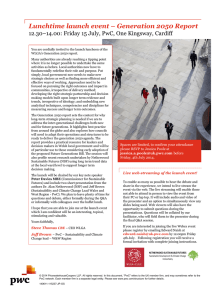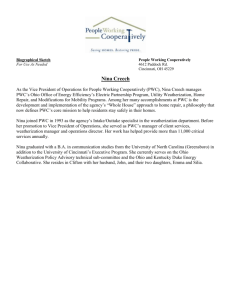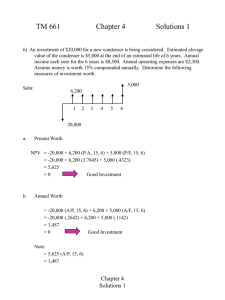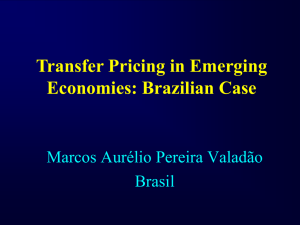Transfer Pricing Challenges related to the new rules and accessory
advertisement
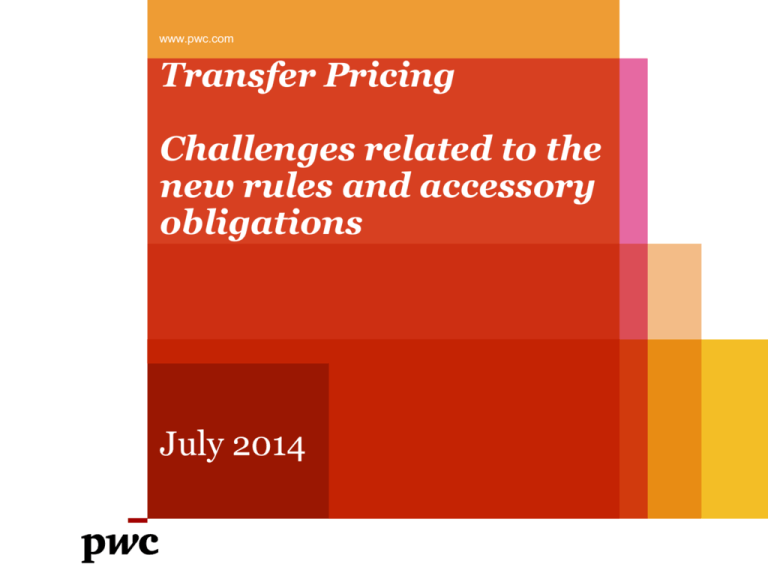
www.pwc.com Transfer Pricing Challenges related to the new rules and accessory obligations July 2014 Changes in Brazilian Transfer Pricing rules Introduction • The Brazilian Government has issued on September 18th, 2012, Law 12,715, a conversion of the Provisional Measure (PM) 563 issued in April 2012, introducing changes to the existing Brazilian transfer pricing regulations. PwC 2 Changes in Brazilian Transfer Pricing rules Introduction • Law 12,715 shall be effective for transactions to be carried out as of 2013, but taxpayers could choose to adopt its provisions for 2012, under conditions established by the tax authorities. • Tax authorities issued Normative Instruction (“NI”) 1312 on December 31st, 2012, providing further guidance on some aspects. PwC 3 Changes in Brazilian Transfer Pricing rules Resale Price Method (PRL) • The methodology to calculate the former PRL-60 (previously applicable to inputs), which gave rise to disputes with the tax authorities at the administrative and judicial courts, should be adopted under the new PRL method - until now it was included in a normative act issued by the tax authorities. PwC 4 Changes in Brazilian Transfer Pricing rules Resale Price Method (PRL) • Unification of the calculation methodology of the PRL, for production and resale • The Resale minus method (PRL) should be calculated considering a specific mark-up determined for some industries and a mark-up of 20% for the industries/sectors which are not specified in the legislation. PwC 5 Changes in Brazilian Transfer Pricing rules Resale Price Method (PRL) ABC Inc. ABC Brazil 20%, 30% or 40% mark up Third party PwC Third party 6 Changes in Brazilian Transfer Pricing rules Resale Price Method (PRL) - specific margins per sector: 40% mark-up 30% mark-up - pharma-chemicals and pharmaceutical products; - glass and glass products - tobbaco products - chemical products - optical, photographic and cinematographic equipment and instruments -pulp, paper and paper products - machines, apparatus and equipment for dental, medical and hospital use - metallurgy - extraction of oil and natural gas - oil derivative products PwC 7 Changes in Brazilian Transfer Pricing rules Resale Price Method (PRL) Changes with the objective to reduce litigation Positive impact only for companies that adopted the tax authorities interpretation (IN 243/02) Effective mark up required to avoid TP adjustment Prior Legislation PRL 60% 150% PRL 20% 42% New legislation PwC PRL 40% 67% PRL 30% 43% PRL 20% 25% 8 Changes in Brazilian Transfer Pricing rules Tested Price – PRL Method Taxpayers are no longer required to include custom duty and other customs expenses in the tested price. Also, they are not required to include freight and insurance contracted with third parties, provided such third parties are not located in low tax jurisdictions or benefit from privileged tax regimes. PwC 9 Changes in Brazilian Transfer Pricing rules Comparable Independent Price Method (PIC) • The use of the taxpayer’s own transactions with third parties for purposes of the use of the PIC method will be acceptable only to the extent the comparable transactions are equivalent to 5% of the tested transactions; to reach this percentage, transactions carried out in the previous year can be considered, if necessary. PwC 10 Changes in Brazilian Transfer Pricing rules Comparable Independent Price Method (PIC) • The NI restricted the use of the PIC method, by establishing that when comparables are not available in the same year the taxpayer may use data from the immediate prior year. Prior regulations allowed the taxpayer to use information from prior and subsequent years. PwC 11 Changes in Brazilian Transfer Pricing rules Comparable Independent Price Method (PIC) • Operations carried out by the company or between third parties Third party PIC Third party PIC PIC (5%) ABC Inc. PwC Sale of goods ABC Brazil 12 Changes in Brazilian Transfer Pricing rules Interest • Interest on related party loans, even if duly registered with the Brazilian Central Bank, are subject to Brazilian TP rules • The new rules affect transactions carried out as of January 1, 2013; for this purpose, the renewal and the renegotiation of contracts will be treated as the signing of a new contract PwC 13 Changes in Brazilian Transfer Pricing rules Interest • The deductibility limit must be verified on the contract date, and it will apply during the full contract term • The same rules apply to determine the minimum interest income to be subject to taxation in Brazil in the case of loans provided by Brazilian entities to a foreign related party PwC 14 Changes in Brazilian Transfer Pricing rules Interest • Interest is deductible only up to the amount that does not exceed the rate determined based on the following rules, plus a spread determined by the Ministry of Finance based on an average market spread: PwC 15 Changes in Brazilian Transfer Pricing rules Interest I Transaction in US dollars - fixed interest rate: rate of Brazilian sovereign bonds issued in US dollars in foreign markets; II Transaction in Brazilian Reais - fixed interest rate: rate of Brazilian sovereign bonds issued in Brazilian Reais in foreign markets, and III All other cases: London Interbank Offered Rate LIBOR for the period of 6 (six) months. PwC 16 Changes in Brazilian Transfer Pricing rules Interest • On August 2, 2013, the Brazilian Ministry of Finance issued Ordinance 427/2013 , in order to provide further guidance on the deductibility and income recognition regarding interest rates on transactions with related parties abroad and beneficiaries domiciled in a low-tax jurisdiction or under a privileged tax regime: PwC 17 Changes in Brazilian Transfer Pricing rules Interest • the interest deduction will be limited to the interest determined considering a spread of 3.5% on top of the maximum interest rate applicable to the case according to the Law; • the minimum interest income to be recognized for tax purposes as of August 3, 2013 on loans granted abroad will be determined considering the spread of 2.5% on top of the minimum interest rate applicable to the case according to the Law. PwC 18 Changes in Brazilian Transfer Pricing rules Interest - Summary Contract Rate - Law 12,766/2012 Rate Fixed interest rate Fixed interest rate Currency USD BRL All other cases* SPREAD Interest Interest paid from abroad to Brazil paid from 01/01/2013 after Brazil to to 08/02/ abroad 08/02/2013 2013 Brazilian sovereign bonds issued in US dollars in foreign markets Brazilian sovereign bonds issued in Brazilian Reais in foreign markets London Interbank Offered Rate LIBOR for the period of 6 (six) months** 3.50% 0.00% 2.50% *The Minister of Finance may fix the rate in case of operations in Brazilian Reais, performed abroad, at floating rate. **For the operations carried out in other currencies in which own Libor rate is not disclosed, the value of the Libor rate for deposits in US dollars should be used. PwC 19 Changes in Brazilian Transfer Pricing rules Profitability Safe Harbor • The NI introduced changes in the Profitability Safe Harbor, available for exports • The minimum profitability required on exports, in order to be relieved from the obligation to prepare TP documentation for exports is now 10% (previously 5%) • It can only be applied in case the net exports to related parties do not exceed 20% of the total of net exports PwC 20 Changes in Brazilian Transfer Pricing rules Methodology change during audit procedures • Taxpayers must annually elect, in the annual tax return, the method to be used for the tested products/services and changes to the method adopted will be accepted only before the start of the audit procedure, unless the tax authorities disqualifies the existing documentation. PwC 21 Transfer Pricing – Fiscal Digital Bookkeeping Calendar year 2014 ECD DIPJ* LALUR FCONT* Calendar year 2015 ECD ECF* DIPJ LALUR FCONT *Special events (i.e. merger): In 2014 the tax return (“DIPJ”) must be filled in. In 2015 and forward the EFC must be filled in. FCONT will depend on the option for the Law nº 12.973/14. PwC 22 Transfer Pricing – Fiscal Digital Bookkeeping Layout - ADE Cofis 98/13: The same information requested in the Tax Return (DIPJ): PwC DIPJ Form ECF Register Description 29A X291 Operation with companies abroad – related parties, interposed and countries with favored taxation. 29B X292 Operation with companies abroad – not related parties, interposed or countries with favored taxation. 30 X300 Operation with companies abroad - exports 31 X310 Operation with companies abroad - exports contractors 32 X320 Operation with companies abroad - imports 33 X330 Operation with companies abroad - imports contractors 23 Transfer Pricing – Fiscal Digital Bookkeeping Common challenges that remain in preparing transfer pricing calculations • Non separation of inventory information ₋ currently all inventory information is included in a single global value that cannot be used for TP purposes ₋ maintain/create separate control reflecting imports from related companies only PwC 24 Transfer Pricing – Fiscal Digital Bookkeeping Common challenges that remain in preparing transfer pricing calculations • Need for detailed breakdown of import costs to permit the exclusion of unrelated import items from the TP calculation ₋ for accounting purposes, freight and insurance paid to third parties and non recoverable taxes on imports are registered in the inventory and costs ₋ these amounts are not included in the import cost for TP purposes and must be controlled separately PwC 25 Transfer Pricing – Fiscal Digital Bookkeeping Common challenges that remain in preparing transfer pricing calculations • Conflicting information for purchases and sales of the same product − the same imported product can be registered under a different unit of measurement or internal code from its local sale − maintain controls to reflect these changes in internal codes and conversion factors that must be used in the TP calculations PwC 26 Transfer Pricing – Fiscal Digital Bookkeeping Common challenges that remain in preparing transfer pricing calculations • Control of inventory produced locally with imported items − the total amount sold in the calendar year must be considered in the TP adjustment, including goods produced in previous years with imported raw materials − create a separate control, based on the bill of material, to identify and consider the finished products that were produced in previous years with imported raw materials in the TP calculations. PwC 27 Transfer Pricing – Fiscal Digital Bookkeeping Common challenges that remain in preparing transfer pricing calculations • Local sales registered in the accounting books − some companies consider all invoices issued in the calendar-year in the TP calculations (PRL method) − for TP purposes. only the valid sales in the calendar year must be considered. Invoices that were cancelled must be excluded from the PRL basis. PwC 28 Contact Rodrigo Bastos rodrigo.bastos@br.pwc.com + 55 11 3674 2209 Cristina Medeiros cristina.medeiros@br.pwc.com + 55 11 3674 2276 Graziela Batista Graziela.batista@br.pwc.com + 55 11 3674 3249 PwC 29 Thank you! © 2014 PricewaterhouseCoopers Serviços Tributários Ltda. Todos os direitos reservados. Neste documento, “PwC” refere-se à PricewaterhouseCoopers Serviços Tributários Ltda., a qual é uma firma membro do network da PricewaterhouseCoopers International Limited, sendo que cada firma membro constitui-se em uma pessoa jurídica totalmente separada e independente. O termo “PwC” refere-se à rede (network) de firmas membro da PricewaterhouseCoopers International Limited (PwCIL) ou, conforme o contexto determina, a cada uma das firmas membro participantes da rede da PwC. Cada firma membro da rede constitui uma pessoa jurídica separada e independente e que não atua como agente da PwCIL nem de qualquer outra firma membro. A PwCIL não presta serviços a clientes. A PwCIL não é responsável ou se obriga pelos atos ou omissões de qualquer de suas firmas membro, tampouco controla o julgamento profissional das referidas firmas ou pode obrigá-las de qualquer forma. Nenhuma firma membro é responsável pelos atos ou omissões de outra firma membro, nem controla o julgamento profissional de outra firma membro ou da PwCIL, nem pode obrigá-las de qualquer forma. PwC
